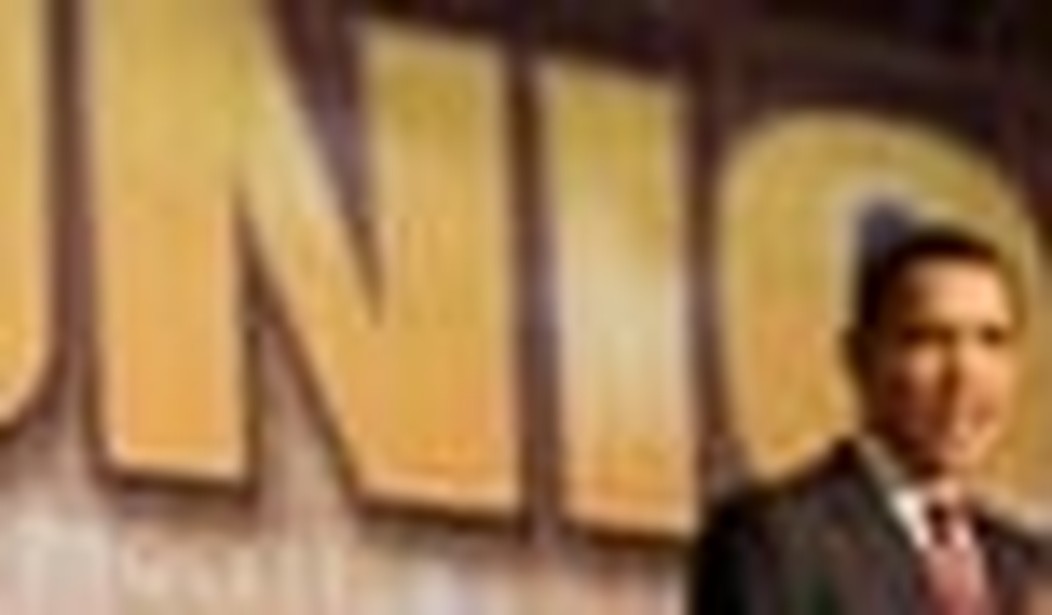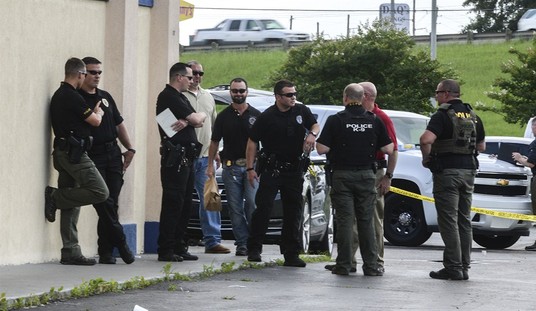Labor unions have a lot at stake in 2008. The AFL-CIO’s PAC is spending $53M to help elect Barack Obama. More is being spent on behalf of Democratic incumbents and challengers in House and Senate seat races. There is nothing dearer to the hearts of Big Labor than securing the White House and a filibuster-proof Senate majority to help them obtain their number one legislative priority: the Orwellian named Employee Free Choice Act (EFCA). And Big Labor will stop at nothing, not even the First Amendment, to achieve their aims.
EFCA isn’t about “choice,” but it would radically alter labor law in America. Current law gives workers the right to a secret ballot vote on whether or not to have a union represent them in their workplace. The right to a secret ballot election has been a mainstay of federal labor law for decades. And just as it does in political elections, it ensures that neither unions nor companies can strong arm employees or exact revenge based on how they vote. EFCA would substitute a “card check” system where employers would be forced to recognize and bargain with a union if a simple majority of employees signed union authorization cards. Those cards are routinely signed by employees in the presence of union officials.
In short, the EFCA abolishes secret ballot union elections. In the words of the statute once that 50% threshold is passed “the [NLRB] shall not direct an election but shall certify the individual organization as the labor representative.”(Emphasis added.)
In the last Congress the measure passed the House but stalled in the Senate, falling nine votes short of the 60 needed for cloture. Gains by Big Labor-supported Democrats in the Senate would deprive opponents of the EFCA of the ability to filibuster. With the White House secure (or 2/3 majority in Congress to override a veto should John McCain be elected) Big Labor would have its prize.
Big Labor’s progress is all the more remarkable given how unpopular the measure is with actual voters. Polling this spring conducted by a business coalition dubbed the Coalition for a Democratic Workplace (“Coalition”) found that voters by overwhelming margins in Minnesota, Colorado, and Maine opposed the measure. Moreover, voters were less likely to vote for Democratic Senate candidates if they supported EFCA.
With the prospect of Democratic gains in 2008, the Coalition launched an eye catching ad campaign which created national buzz and headaches for Democratic candidates. Featuring Vince Curatola (better known as “Johnny Sack” in the Sopranos), the first ad showed Curatola as a labor mobster crowding into a voting booth which vanishes with a snap of his fingers, leaving the hapless worker at the mercy of a gang of menacing labor thugs. That got laughs and plenty of buzz.
But then the Coalition turned it up a notch, taking on Al Franken in his Minnesota Senate race against Republican Norm Coleman. Curatola was back in a new ad, snapping his fingers to remove a recalcitrant cut out figure of Coleman and replacing it with Al Franken, who the ad informs voters favors EFCA and wants to eliminate secret ballot elections.
That was too much to bear for the handmaidens of Big Labor. Minnesota’s Democratic Farmer Labor (DFL) Party swung into action. In a brazen attempt to shut down EFCA opponents, the DFL filed a complaint with the Minnesota Office of Administrative Hearings lawsuit against the Coalition, a grassroots organization, two political consultants, the head of the Coalition Brian Worth and even Curatola himself.
The DFL claimed the ad was misleading in that EFCA would not abolish secret ballot elections but simply give unions and employees “another option.” The DFL contends therefore that Franken’s support for EFCA doesn’t amount to support for eliminating the secret ballot or opposition to workplace privacy. Left unsaid by the DFL: the “option” is for unions not employees, once the 50% threshold is reached no election is to be held and no union which is able to persuade at least a bare majority of workers would conceivably rely on less than 50% of authorization cards and risk a secret ballot election.
An administrative law judge in Minnesota dismissed the original complaint but an amended complaint was re-filed against the Coalition, Worth and longtime GOP guru Mike Murphy from the Coalition’s political consulting firm. At a subsequent hearing Murphy and Worth were dismissed but no decision has been rendered on the Coalition or on the underlying merits of the suit.
I asked Worth about the DFL’s unusual tactic of suing to shut down an ad. He said, “Frankly I’m not surprised. They can’t argue on the merits.” The press coverage of this extraordinary tactic has been minimal. Again, Worth says that it “is not remotely surprising. These are the guys who won’t report on John Edwards.” Worth says that the claim that the measure does not abolish secret ballot elections and that Franken doesn’t favor this move is belied by the language of the statute which he explains is “crystal clear.”
It is plain that DFL is telling tall tales. Even George McGovern understands what is up. He wrote in the Wall Street Journal:
The key provision of EFCA is a change in the mechanism by which unions are formed and recognized. Instead of a private election with a secret ballot overseen by an impartial federal board, union organizers would simply need to gather signatures from more than 50% of the employees in a workplace or bargaining unit, a system known as “card-check.” There are many documented cases where workers have been pressured, harassed, tricked and intimidated into signing cards that have led to mandatory payment of dues.
Under EFCA, workers could lose the freedom to express their will in private, the right to make a decision without anyone peering over their shoulder, free from fear of reprisal.
Rhonda Bentz, a political consultant who was dismissed from the original DFL complaint, says that neither she nor Murphy, a veteran of dozens of campaigns, have “ever been involved in anything like this.” She notes the irony that Al Franken, a “creative artist” would be involved in what can only be described as “censorship of political speech.” As for the ads, she surmises, “If they weren’t having an impact they would be ignoring them.” She explains, “They have a Sisyphean task in moving a boulder up the hill to say that secret ballots won’t be eliminated [by the EFCA].”
It seems unlikely that political free speech could be suffocated. But if Big Labor does somehow manage to prevail in its Minnesota suit it will be the ultimate proof that Big Labor isn’t interested in democracy — either in or outside the workplace.
And the battle over EFCA won’t end in Minnesota. An ad targeting Democratic Senate candidate Tom Allen has gone on the air in Maine. With got Senate races in New Hampshire and Colorado it is likely those will be battlegrounds as well. But the purpose Worth says is not to defeat select Democratic candidates but to force elected officials of both parties once the election is over to “go to their leadership and say ‘I saw what they did in Minnesota.’ I want to rethink this.”
Provided Big Labor doesn’t shut down the First Amendment rights of EFCA opponents in Minnesota, those catchy ads will continue to attract attention. But if Curatola ever decides to take a breather the Coalition could also hire McGovern to deliver his message to the voters and Big Labor:
To my friends supporting EFCA I say this: We cannot be a party that strips working Americans of the right to a secret-ballot election. We are the party that has always defended the rights of the working class. To fail to ensure the right to vote free of intimidation and coercion from all sides would be a betrayal of what we have always championed.
Could Big Labor shut down that message? Fuggetaboutit.









Join the conversation as a VIP Member